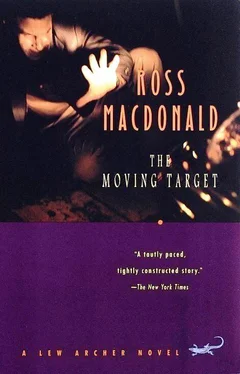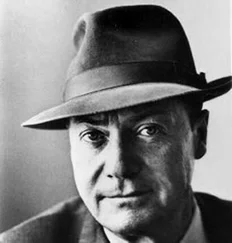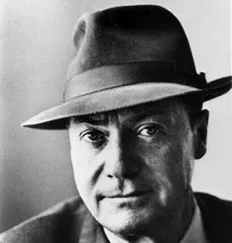We hit a downdraft and fell a hundred feet. Her left hand grasped his knee. He let it stay there.
What was obvious to me must have been obvious to Albert Graves. Miranda was Taggert’s if he wanted her, brain and body. Graves was wasting his time, building himself up to a very nasty letdown. I knew enough about him to understand it. Miranda was everything he’d dreamed about – money, youth, bud-sharp breasts, beauty on the way. He’d set his mind on her and had to have her. All his life he’d been setting his mind on things – and getting them.
He was a farmer’s son from Ohio. When he was fourteen or fifteen his father lost his farm and died soon after. Bert supported his mother by building tires in a rubber factory for six years. When she died he put himself through college and came out a Phi Beta Kappa. Before he was thirty he had taken his law degree at the University of Michigan. He spent one year in corporation law in Detroit and decided to come west. He settled in Santa Teresa because he had never seen mountains or swum in the sea. His father had always intended to retire in California, and Bert inherited the Midwestern dream – which included the daughter of a Texas oil millionaire.
The dream was intact. He’d worked too hard to have any time for women. Deputy D. A., City Attorney, D. A. He prepared his cases as if he were laying the foundations of society. I knew, because I’d helped him. His courtroom work had been cited by a state-supreme-court judge as a model of forensic jurisprudence. And now at forty Graves had decided to beat his head against a wall.
But perhaps he could scale the wall, or the wall would fall down by itself. Taggert shook his leg like a horse frightening flies. The plane veered and returned to its course. Miranda removed her hand.
With a little angry flush spreading to his ears, Taggert pulled the stick and climbed – climbed as if he could leave her behind and be all alone in the heart of the sky. The thermometer in the roof sank below forty. At eight thousand feet I could see Catalina far down ahead to the right. After a few minutes we turned left toward the white smudge of Los Angeles.
I shouted over the roar: “Can you set her down at Burbank? I want to ask some questions.”
“I’m going to.”
The summer heat of the valley came up to meet us as we circled in. Heat lay like a fine ash on the rubbish lots and fields and half-built suburbs, slowing the tiny cars on the roads and boulevards, clogging the air. The impalpable white dust invaded my nostrils and dried my throat. Dryness of the throat went with the feeling I always had, even after half a day, when I came back to the city.
The taxi starter at the airport wore steel-wire armbands on the sleeves of his red-striped shirt. A yellow cap hung almost vertically from the back of his gray head. Seasons of sun and personal abuse had given him an angry red face and an air of great calm.
He remembered Sampson when I showed him the photograph.
“Yeah, he was here yesterday. I noticed him because he was a little under the weather. Not blotto, or I would of called a guard. Just a couple of drinks too many.”
“Sure,” I said. “Was anybody with him?”
“Not that I saw.”
A woman wearing two foxes that looked as if they had died from the heat broke out of the line at the curb. “I have to get downtown right away.”
“Sorry, madam. You got to wait your turn.”
“I tell you this is urgent.”
“You got to wait your turn,” he said monotonously. “We got a cab shortage, see?”
He turned to me again. “Anything else, bud? This guy in trouble or something?”
“I wouldn’t know. How did he leave?”
“By car – a black limousine. I noticed it because it didn’t carry no sign. Maybe from one of the hotels.”
“Was there anybody in it?”
“Just the driver.”
“You know him?”
“Naw. I know some of the hotel drivers, but they’re always changing. This was a little guy, I think, kind of pale.”
“You don’t remember the make or the license number?”
“I keep my eyes open, bud, but I ain’t a genius.”
“Thanks.” I gave him a dollar. “Neither am I.”
I went upstairs to the cocktail bar, where Miranda and Taggert were sitting like strangers thrown together by accident.
“I called the Valerio,” Taggert said, “The limousine should be here any minute.”
The limousine, when it came, was driven by a pale little man in a shiny blue-serge suit like an umpire’s and a cloth cap. The taxi starter said he wasn’t the man who had picked up Sampson the day before.
I got into the front seat with him. He turned with nervous quickness, gray-faced, concave-chested, convex-eyed. “Yes, sir?” The question trailed off gently and obsequiously.
“We’re going to the Valerio. Were you on duty yesterday afternoon?”
“Yes, sir.” He shifted gears.
“Was anybody else?”
“No, sir. There’s another fellow on the night shift, but he doesn’t come on till six.”
“Did you have any calls to the Burbank airport yesterday afternoon?”
“No, sir.” A worried expression was creeping into his eyes and seemed to suit them. “I don’t believe I did.”
“But you’re not certain.”
“Yes, sir. I’m certain. I didn’t come out this way.”
“You know Ralph Sampson?”
“At the Valerio? Yes, sir. Indeed I do, sir.”
“Have you seen him lately?”
“No, sir. Not for several weeks.”
“I see. Tell me, who takes the calls for you?”
“The switchboard operator. I do hope there’s nothing wrong, sir. Is Mr. Sampson a friend of yours?”
“No,” I said. “I’m one of his employees.”
All the rest of the way he drove in tight-mouthed silence, regretting the wasted sirs. When I got out I gave him a dollar tip to confuse him. Miranda paid the fare.
“I’d like to look at the bungalow,” I told her in the lobby. “But first I want to talk to the switchboard operator.”
“I’ll get the key and wait for you.”
The operator was a frozen virgin who dreamed about men at night and hated them in the daytime. “Yes?”
“Yesterday afternoon you had a call for a limousine from the Burbank airport.”
“We do not answer questions of that nature.”
“That wasn’t a question. It was a statement.”
“I’m very busy,” she said. Her tone clicked like pennies; her eyes were small and hard and shiny like dimes.
I put a dollar bill on the desk by her elbow. She looked at it as if it was unclean. “I’ll have to call the manager.”
“All right. I work for Mr. Sampson.”
“Mr. Ralph Sampson?” She lilted, she trilled.
“That’s correct.”
“But he was the one that made the call!”
“I know. What happened to it?”
“He canceled it almost immediately, before I had an opportunity to tell the driver. Did he have a change of plan?”
“Apparently. You’re sure it was him both times?”
“Oh yes,” she said. “I know Mr. Sampson well. He’s been coming here for years.”
She picked up the unclean dollar lest it contaminate her desk, and tucked it into a cheap plastic handbag. Then she turned to the switchboard, which had three red lights on it.
Miranda stood up when I came back to the lobby. It was hushed and rich, deep-carpeted, deep-chaired, with mauve-coated bellboys at attention. She moved like a live young nymph in a museum. “Ralph hasn’t been here for nearly a month. I asked the assistant manager.”
“Did he give you the key?”
“Of course. Alan’s gone to open the bungalow.”
I followed her down a corridor that ended in a wrought-iron door. The grounds back of the main building were laid out in little avenues, with bungalows on either side, set among terraced lawns and flower beds. They covered a city block, enclosed by high stone walls like a prison. But the prisoners of those walls could lead a very full life. There were tennis courts, a swimming pool, a restaurant, a bar, a night club. All they needed was a full wallet or a blank checkbook.
Читать дальше












